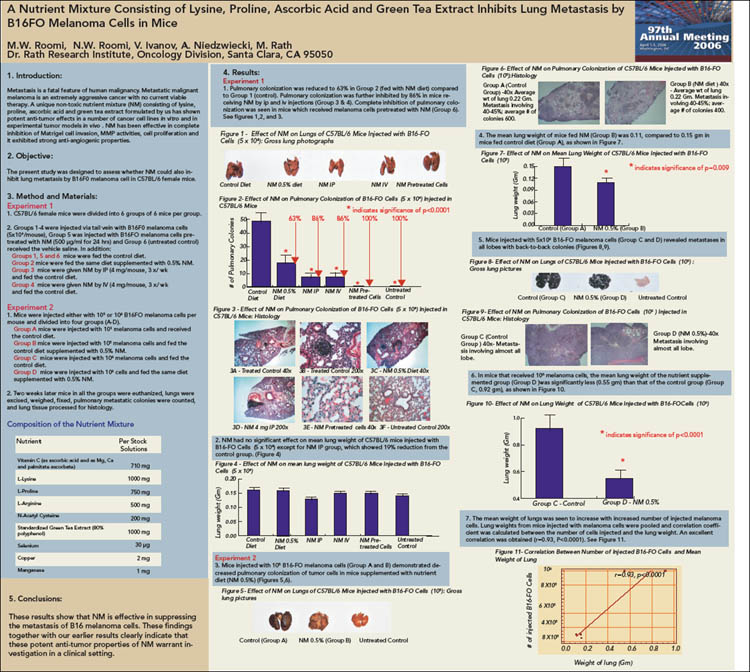M.W. Roomi, N.W. Roomi, V. Ivanov, A. Niedzwiecki, M. Rath
Dr. Rath Research Institute, Oncology Division, Santa Clara, CA 95050
Presented at:
97th Annual Meeting of the AACR, Washington DC, April 1-5, 2006
Published in:
Proceedings of the 97th Annual Meeting of the AACR, Abstract #1903
Abstract
Introduction:
Metastasis is a fatal feature of human malignancy. Metastatic malignant melanoma is an extremely aggressive cancer with no current viable therapy. A unique non-toxic nutrient mixture (NM) consisting of lysine, proline, ascorbic acid and green tea extract formulated by us has shown potent anti-tumor effects in a number of cancer cell lines in vitro and in experimental tumor models in vivo. NM has been effective in complete inhibition of Matrigel cell invasion, MMP activities, cell proliferation and exhibited strong anti-angiogenic properties.
Objective:
The present study was designed to assess whether NM could also inhibit lung metastasis by B16F0 melanoma cell in C57BL/6 female mice.
Method and Materials: C57BL/6 female mice were divided into 6 groups of 6 mice per group; Groups 1-4 were injected via tail vein with B16F0 melanoma cells (5x104/mouse) and Group 6 (control group) received the vehicle saline. Group 1 was fed the control diet, Group 2 was fed the same diet supplemented with 0.5% NM, Group 3 and 4 were given NM by ip and iv (4mg/mouse, three times a week) respectively, and fed the control diet. Group 5 mice were fed the control diet but injected with B16F0 melanoma cells pretreated with NM (500 µg/ml for 18 hrs). In another experiment, mice were injected either with 105 or 106 B16FO melanoma cells per mouse and divided into four groups (A-D). Groups A and C were fed the control diet while groups B and D were fed the same diet supplemented with 0.5% NM. Two weeks later mice in all the groups were euthanized, lungs were excised, weighed, fixed, pulmonary metastatic colonies were counted, and lung tissue processed for histology.
Results:
Pulmonary colonization was reduced to 63% in Group 2 (fed with NM diet) compared to Group 1 (control). Pulmonary colonization was inhibited by 86% in mice receiving NM by ip and iv injections (Groups 3 & 4). Complete inhibition of pulmonary colonization was seen in mice that received melanoma cells pretreated with NM (Group 5). These findings were corroborated with histological analysis. Furthermore, the inhibitory effect of NM was also confirmed by comparing the weight of lungs. For example, in mice that received 106 cells, the NM fed group (Group D) had an average lung weight of 0.55 gm, compared to 0.92 gm in the control group ( Group C). Histopathology revealed metastasis in all lobes with back-to-back colonies, which were difficult to count. Similar inhibition was seen in the mice that received 105 cells. For example, an average lung weight of mice fed NM (Group B) was 0.11, compared to 0.15 gm in mice fed control diet (Group A). Metastasis involved 40-45% of the lung. The average number of colonies in the control group (A) was 600, while in NM-fed group (B) it was 400 (33% reduction). Results from the control and the test groups for weight of lungs and number of cells inoculated were pooled and correlation coefficient was calculated. An excellent correlation was obtained (r=0.93, P<0.0001)
Conclusions:
These results show that NM is effective in suppressing the metastasis of B16FO melanoma cells. These findings together with our earlier results clearly indicate that these potent anti-tumor properties of NM should be tested in clinical setting.
Comment
Tumor metastasis is a major reason for treatment failure in cancer patients. Metastatic malignant melanoma is an extremely aggressive cancer with no current viable therapy. The primary objective of our study was to investigate whether a unique non-toxic nutrient mixture (NM) that has shown potent anti-tumor effects in a number of cancer cell lines, could inhibit experimentally induced lung metastasis of melanoma cells in C57BL/6 mice. Intravenous injection of melanoma cells into C57BL/6 mice has been shown to result in pulmonary metastasis, providing an excellent model to assess test agents on metastasis. This study demonstrated the effectiveness of NM in halting metastasis of B16FO cells in mice, especially when delivered by iv or ip. Furthermore, pre-incubation of tumor cells with NM for 18 hrs prior to injection into the mice completely prevented the development of lung tumors in these mice. These results are significant since they clearly demonstrate the anti-metastatic potential of NM, a non-toxic nutrient mixture.
